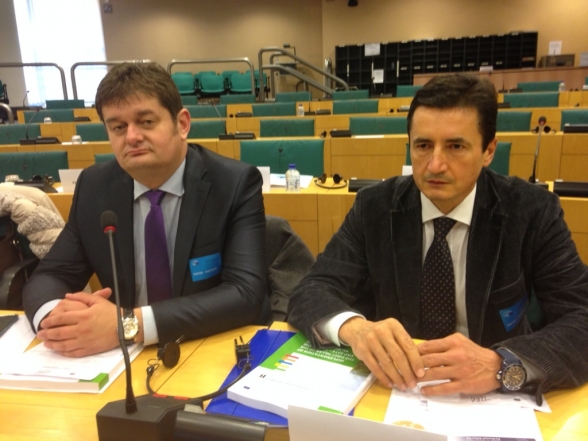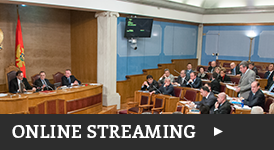Delegation of the Parliament of Montenegro, composed of MPs Mr Predrag Sekulić and Mr Danko Šarančić, took part in a one-day seminar titled: “Reform of the 2013 Common Agricultural Policy - impact on the accessing countries”, organised by the European Parliament, in Brussels.
Leading principles and elements of common agricultural policy were presented at the seminar: direct payments, single market organisation, rural development, horizontal legislation regulating the rules on financing, managing and monitoring the common agricultural policy and its perspectives in the future.
The EU has around 11 million persons working full-time jobs in the agricultural sector. Agriculture and agricultural and food industry, that depends on agriculture sector, have a joint share which does not exceed five percent of the European Union GDP, with 15 million of enterprises and 44 million of job positions. The forms of activities are very diverse. It comprises intensive, classic and organic agriculture, and the basic challenges are related to the need for producing a greater amount of food for increasing world population, environmental protection, competitiveness of agricultural products and market orientation of producers.
The Common Agricultural Policy aims to maintain agriculture that guarantees food safety (in the context of climate change) and ensure sustainable and balanced development of all European rural areas, including areas with difficult production conditions. Such agriculture should respond to citizens' concerns in terms of food (its availability, price, variety, quality and safety) and protection, and allow farmers to live from their activities.
One of the main goals of the reform of the CAP, adopted in 2013, is reducing the difference in the amount of financial support that Member States assist their farmers. The aim is to equalise help in the period 2014-2020. Direct payments help preserving agriculture in the overall EU area, guaranteeing a minimal income stability to agricultural labour force.
The seminar presented accurate data about the declining number of farmers, due to the weight of work and small investment for starting agricultural business. In this moment, 4.5 million of the agricultural labour force is older than 65 years and only six percent is younger than 35 years. It is necessary to increase the attractiveness of the profession and help young people to be engaged. Direct payments include a new scheme which provide for mandatory and voluntary payments to the agricultural labour force. Mandatory payments comprise the so-called basic payments amounting to 75 euros per hectare of arable land, "ecological” payments amount EUR 90 per hectare (to farmers who protect and enhance the environment) and payments to young people who choose to work in agriculture, which amounts to 25 euros per hectare for the first five years of practicing this activity. Since 2014 the European Agricultural Fund for Rural Development (EAFRD) fits into the new common strategic framework, and the European Regional Development Fund (ERDF), European Social Fund (ESF), Cohesion Fund and the European Maritime and Fisheries Fund, in order to achieve the objectives of the Europe 2020 strategy (sustainable and smart development).
At the end of the seminar, the participants concluded that almost 70 percent of the acquis was related to agriculture and emphasised expectations that the Western Balkans region would find its interest in agricultural policy of the European Union, so the Common Agricultural Policy would develop, bearing in mind the principles of competition, sustainability and simplification of important policy.
The seminar was attended by delegations from parliaments of Albania, Bosnia and Herzegovina, Macedonia, Kosovo, Serbia and Turkey.










